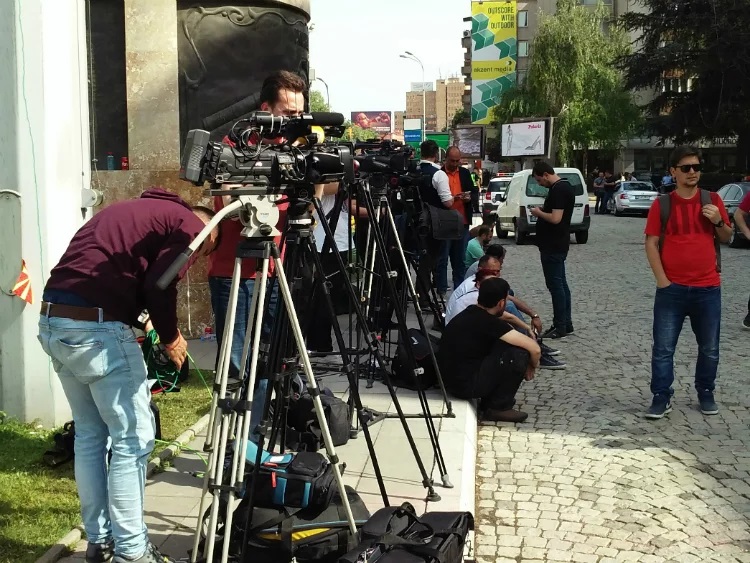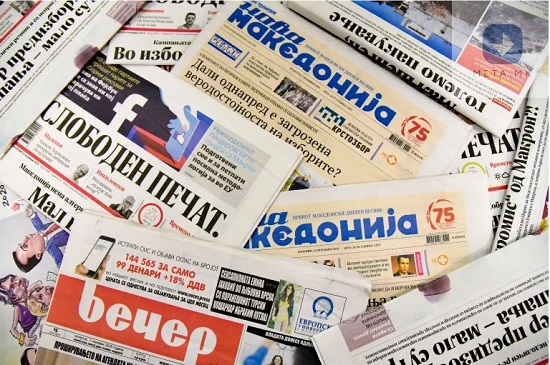A galimatias of owners, business and political centres, all of this creates fertile ground for foreign influence on the media, as well as a pronounced degree of interference and pressures on the freedom of journalism and professional journalism standards
Author: Aleksandar Bozhinovski
In Macedonia, few media outlets rely solely on the trust and popularity of their audience, and those that operate in such a manner are struggling for survival on a daily basis. A characteristic trend in the past 15 years has been the penetration of Serbian, Albanian, Turkish, and Hungarian media. Recently, there has been a tendency for media outlets from Bulgaria to enter the market as well.
Research conducted by SCOOP showed that the majority of media outlets are owned by Macedonian citizens. According to documents obtained from the Central Registry of Macedonia (CRRNM), none of the media outlets are owned by individuals or companies with capital from non-democratic countries such as Russia and China, which are considered to have a potentially harmful influence in the country.
According to the analysis by the Macedonian Institute for Media (MIM) on the ownership and financial models of the most influential TV channels in Macedonia, Croatia, and Slovenia, the ownership of media outlets in Macedonia is formally clean, but the connections between owners and political and business centres of power are not effectively severed. For now, considering how the competencies of institutions are established, no one can, and as practice has shown, there is no willingness to investigate the hidden connections that media outlets maintain with political and business centres of power. As a result, political influences on some highly influential national TV channels were explicitly present during the research period, to the extent of their misuse for propaganda dissemination.
Television – the most effective means of influence
Television remains the most influential media in the country. According to the latest survey by IRI conducted in September and October 2022, nearly 81 per cent of respondents stated that they get informed about political events through television as their primary media source. Although internet media is growing, it is far behind television as an information source, with only 39 per cent of the audience relying on it, while print media serves as an information source for only 7 per cent of the audience.
According to official data from the Agency for Audio and Audiovisual Media Services, out of a total of 111 licensed broadcasters, 45 are television stations and 66 are radio stations. Twelve legal entities and 39 natural persons are listed as owners of television stations. Specifically, the television stations Alfa, Alsat-M, Sitel, Telma, Kompani 21-M, Shenja, Klan, 24 Vesti, City, Iris, K&M, M NET-HD, and Era are owned by legal entities.
Television as an extension of business for spreading influence and pursuing business interests has been a norm in the Macedonian media landscape for quite some time. It is often intertwined with high-level politics. Recent declarations of hostility towards Alfa and Telma television stations, as well as the liquidation of A1 TV in 2009, were influenced by both business and political interests.
Alfa TV, which has been regarded as critical of the current government in recent years, was recently fined for tax evasion. The Skopje Criminal Court ruled that the television station had failed to pay taxes amounting to 84,000 euros in 2013 and 2014, and ordered it to pay the court costs of around 1,200 euros, and imposed an additional fine of 5,000 euros. The verdict is a first-instance ruling and can be appealed to the Court of Appeal. In 2021, the Public Revenue Office sued the television station for failing to pay taxes on loans in 2014.
This television station was initially founded by a Greek owner and later acquired by Fershped and Shterjo Nakov. It was then sold to Comtrade, owned by Serbian businessman Veselin Jevrosimović, who subsequently sold it to the company Alfa SKOP, where the owners listed by the Agency for Audio and Audiovisual Media Services are AD Europa with 11%, Makoshped with 17%, CHS Invest Group with 57%, and Tehnometal Vardar in bankruptcy with 15%. Alfa TV is part of the so-called group of Hungarian media, as the majority shareholder, CHS Group, is associated with the company Target Media from Skopje, which is 100% owned by Hungarian Peter Schatz.
Television station Telma is wholly owned by the company Makpetrol, which is engaged in the distribution of oil and oil derivatives. The ownership has remained unchanged for a long time. The same applies to Sitel Television, where the legal entity Monteko has appeared over the years. This television station has been under the control of the Ivanov family from Kratovo since its establishment, just like Kanal 5, which is owned by the Stojmenov family.
Nasha TV is owned by the actor Risto Gogovski (“Golemata Voda”(The Great Water), “Balkan kan kan”), who is also the owner of a marketing agency and several radio stations. The television station 24 Vesti is owned by Cable 24 from Linz, and the owner of this company is Austrian Jürgen Meixner, married to a woman from Shtip.

Photo: Meta
The group of Albanian-language television stations is mostly owned by individuals from Albania and Kosovo. Two television stations are owned by legal entities from North Macedonia: Alsat-M, which has been owned by VE-VE Group, in the possession of the Velija family and TV Shenja, which is owned by the Foundation for Culture and Education with Taxhudin Shabani, one of the founders of the Foundation Center of Islamic Civilization being the sole owner. In Pristina, Kosovo, there is a registered company called Kompani 21, which is behind 21 TV in Skopje. Klan TV Macedonia is owned by ADV Klan, based in Tirana, Albania.
Ownership Connections among Broadcasters
As owners of the 66 licensed radio stations, there are 11 legal entities and 65 natural persons. The legal entities that own radio stations include Kanal 77, Urban FM, Lider, PRO-FM, Sveti Nikole, Angels, the student radios STUDENT FM 92.9, UKLO FM, UGD FM, and the religious radio Maria Blagovest.
There are ownership connections among radio broadcasters in four cases: Shenja TV and Era TV, Nasha TV and RFM Radio Station, Polog TV and Uskana Media TV, and between Radio Metropolis and Radio City.
Foreign individuals (legal entities and natural persons) are owners of four radio broadcasters: Kompani 21-M TV, Klan TV, 24 Vesti TV, and Radio 7. In 2020, the Agency approved a change in the ownership structure of three radio stations (Radio Fama, Radio Kiss, and Radio Jon) and one television station (Kanal Vizija TV).
Print Media Unchanged
The register of print media publishers lists 22 entities that publish 27 print media outlets.
In terms of newspapers, there haven’t been significant changes. Sloboden Pechat continues to be owned by the Serbian company Adria Media Balkan, through its subsidiary in Macedonia, Pechat mk. Former owners were Vladimir Koshevaliski and Gradimir Jovanovikj.

Photo: Meta/archive
Nova Makedonija is still owned by Repro One Limited from the British Virgin Islands. For a long time, there have been rumours that the businessman Mincho Jordanov is behind this company. The second oldest daily newspaper, Vecher, is owned by Vecher Press, which is in the possession of the Andreski family, who also operate the portal vecer.pres. There is also the domain vecer.mk, owned by the marketing agency of Dragan Pavlovikj Latas, Maksmedia, which includes the aggregator Vesti.mk and Vesnik.com. Fokus, the oldest weekly newspaper, is still surviving and is owned by Biljana, the wife of the late founder Nikola Mladenov.
Web Portals: A Story of Their Own
In the online space, there are so many portals with the “.mk” domain that one can’t imagine counting them all. Some have formed groups, such as the case with Clip Media owned by Igor Leshtar, the former owner of Seavus. This includes A1On, the portal formed by former journalists from the defunct A1 television and owned by Predrag Petrovikj. It has been part of Clip Media for the past five years. This group also includes the first private news agency, Makfax, Reporter, Makedonika, Dodaj Gas, the aggregator Grid, and others.
Another group of portals with the same owner is Republika (Adinamik Media) and Kurir (owned by EMI Media). These two portals are part of the so-called Hungarian media. Previously, Lider.mk was also included in this group, but it is now owned by General Heralding, in the possession of Ljupcho Zlatev, who later founded Lider FM 107.4 radio.
The company “Faktor Portal DOO” is the founder of the economic portal Faktor and also operates the online portals “Zhenski Magazin” (Women’s Magazine), “Mashki Magazin” (Men’s Magazine), and “Hashtag”. Faktor was formed by Krste Shajnoski and Aleksandar Manev, but later Krste Shajnoski withdrew from ownership after being appointed as the President of the Expert Council of the Insurance Supervision Agency.
The group is headquartered at the same address as the company “Faktor Media Group DOO,” which was established in 2019 and is owned by the spouses of Manev and Shajnoski, Katerina and Svetlana.
Faktor is a member of IAB Macedonia, an organization for the advancement of digital marketing.
As of recently, the portal Antropol, which is considered to be a media outlet of the political party Levica, came into existence. The founders of the association Media Association for Citizen Informing, Antropol, include almost all members of the Presidium of Levica, except for the leader Dimitar Apasiev. The party’s website lists Jovan Krajevski as the founder of Antropol, although the current status of the association also includes the names of Redzep Ismail Haktan, an advisor in the City of Skopje, Branko Ristov, the president of the council of the municipality of Karposh, Gorast Muratovski, as well as the General Secretary of Levica, Jovana Mojsoska.
Foreign Influence through Domestic Media
Experts say that although there is no media outlet in the country owned by Russian or Chinese citizens, it does not mean that there is no influence from these countries. Russia Today and Sputnik are considered leading infiltrators of manipulative information in the region and the country.

Professor Marina Tuneva. Photo: screenshot/video
Marina Tuneva, professor of communication and expert in public relations, states that political events such as the elections, the referendum, the name change of the country, and the dispute with neighbouring Bulgaria have been fertile ground for many campaigns of influence and disinformation. In a politically and ethnically polarized country like North Macedonia, such influences more often than not escalate into hate speech, threats, and verbal violence between opposing groups. All of this undermines democracy and social cohesion.
“The country’s geopolitical position itself makes it susceptible to influences from foreign factors and centres, which are mostly directed against its goals of integration into the EU. High-ranking politicians publicly point to Russia as one of the sources of such influences in the Balkans, including Macedonia. For example, in an interview last year, the President of the country, Stevo Pendarovski, mentioned that Russia produces extremely serious hybrid threats to the entire Balkan region, including political propaganda and disinformation campaigns. He emphasized that their complexity and intensity are the same as those in 2018 during the referendum on the Prespa Agreement. Such campaigns are amplified by domestic actors and media that follow their political agendas and interests. Internet portals and social media play a significant role in this, either due to their potential to reach a large audience or due to their clientelist relationship with political centres of power. Based on the GlobSec research from 2021 regarding the vulnerability of Central European and Western Balkan countries to Russian and Chinese influence, North Macedonia is ranked as the most resilient among the Western Balkan countries, but it is still a vulnerable and polarized society with antagonistic political blocs. While the majority of the population still supports the outlined process of EU accession, the views of the sympathizers of the authoritarian rule in the Kremlin and Beijing also play a significant role. Such views are reinforced through the information space and the susceptibility of media to influence,” evaluates Tuneva.
Sefer Tahiri, a journalist and university professor, believes that foreign influences are always sophisticated and rarely direct and unambiguous.
“From the analysis of the content of certain media, which I conduct for specific projects, it can be observed that some media outlets are inclined towards Putin’s Russian politics, which may be the result of influence from certain centres. Of course, there are also media outlets where the anti-Russian narrative prevails, which is a result of the stance of those media outlets, going against the Russian invasion,” says Tahiri.

Snezhana Trpevska. Photo: RESIS/web
Snezhana Trpevska, an expert on media policies from the RESIS Institute, points out that in recent years, both in our country and in the entire region, there have been several attempts at external influence. These attempts were probably most intensified in 2018, during the period before and during the Referendum for the name change of the country, as a precondition for NATO and EU membership, immediately after the signing of the Prespa Agreement (June 2018).
“According to some analyses conducted during that period, the leading source of disinformation in the entire region was Russia, through various channels, but mostly through its state-controlled media outlets Russia Today and Sputnik. In our country, most of the disinformation related to the political events surrounding the referendum and the Prespa Agreement was spread by certain domestic online media outlets (Infomax, Kurir, Expres…) and some national TV stations (Alfa TV), whose editorial policies were visibly biased towards the opposition party VMRO-DPMNE and the Russian foreign policy. This was further reinforced by the widespread counter-campaign on social media (strongly supported by opposition groups) organized by the movement ‘Bojkotiram’,” says Trpevska.
Among recent studies on the subject is the one conducted by Metamorphosis in the period from November 2021 to April 2022. The conclusion is that disinformation campaigns intensified immediately after the outbreak of the war in Ukraine on February 24, 2022. However, it was also found that “the majority of disinformation articles originated from social media platforms, with 152 of the analyzed articles being personal posts on Facebook, while only eight were articles from traditional media.” Furthermore, disinformation predominantly relied on media articles from domestic and foreign sources (76 out of all disinformation articles), followed by social media posts (38 posts, including 19 on Facebook and 14 on Twitter). Disinformation also had a lesser presence on YouTube (16), websites (13), and other sources.
“The concentration of media ownership and the direct connection of media owners with business and politics, as well as the reform of the public service and AAMVS and the chaos in the online sphere, are key issues in the media system. The connection between business and media undoubtedly affects the freedom of journalists, leading to self-censorship,” says Sefer Tahiri, PhD, regarding this news story.
In conclusion, the galimatias of owners, business and political centres creates fertile ground for influence on the media and a pronounced degree of impact on the freedom of journalism and professional journalism standards.




